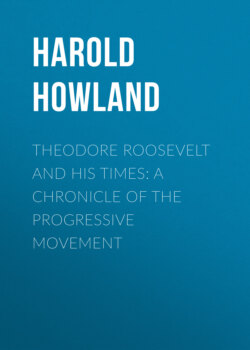Theodore Roosevelt and His Times: A Chronicle of the Progressive Movement

Реклама. ООО «ЛитРес», ИНН: 7719571260.
Оглавление
Harold Howland. Theodore Roosevelt and His Times: A Chronicle of the Progressive Movement
Theodore Roosevelt and His Times: A Chronicle of the Progressive Movement
Table of Contents
THEODORE ROOSEVELT AND HIS TIMES
CHAPTER I. THE YOUNG FIGHTER
CHAPTER II. IN THE NEW YORK ASSEMBLY
CHAPTER III. THE CHAMPION OF CIVIL SERVICE REFORM
CHAPTER IV. HAROUN AL ROOSEVELT
CHAPTER V. FIGHTING AND BREAKFASTING WITH PLATT
CHAPTER VI. ROOSEVELT BECOMES PRESIDENT
CHAPTER VII. THE SQUARE DEAL FOR BUSINESS
CHAPTER VIII. THE SQUARE DEAL FOR LABOR
CHAPTER IX. RECLAMATION AND CONSERVATION
CHAPTER X. BEING WISE IN TIME
CHAPTER XI. RIGHTS, DUTIES, AND REVOLUTIONS
CHAPTER XII. THE TAFT ADMINISTRATION
CHAPTER XIII. THE PROGRESSIVE PARTY
CHAPTER XIV. THE GLORIOUS FAILURE
CHAPTER XV. THE FIGHTING EDGE
CHAPTER XVI. THE LAST FOUR YEARS
BIBLIOGRAPHICAL NOTE
Отрывок из книги
Harold Howland
Published by Good Press, 2019
.....
Those first years in the political arena were not only a fighting time, they were a formative time. The young Roosevelt had to discover a philosophy of political action which would satisfy him. He speedily found one that suited his temperament and his keen sense of reality. He found no reason to depart from it to the day of his death. Long afterward he told his good friend Jacob Riis how he arrived at it. This was the way of it:
From the moment that he had learned this valuable lesson—and Roosevelt never needed to learn a lesson twice—he had his course in public life marked out before him. He believed ardently in getting things done. He was no theoretical reformer. He would never take the wrong road; but, if he could not go as far as he wanted to along the right road, he would go as far as he could, and bide his time for the rest. He would not compromise a hair's breadth on a principle; he would compromise cheerfully on a method which did not mean surrender of the principle. He perceived that there were in political life many bad men who were thoroughly efficient and many good men who would have liked to accomplish high results but who were thoroughly inefficient. He realized that if he wished to accomplish anything for the country his business was to combine decency and efficiency; to be a thoroughly practical man of high ideals who did his best to reduce those ideals to actual practice. This was the choice that he made in those first days, the companionable road of practical idealism rather than the isolated peak of idealistic ineffectiveness.
.....